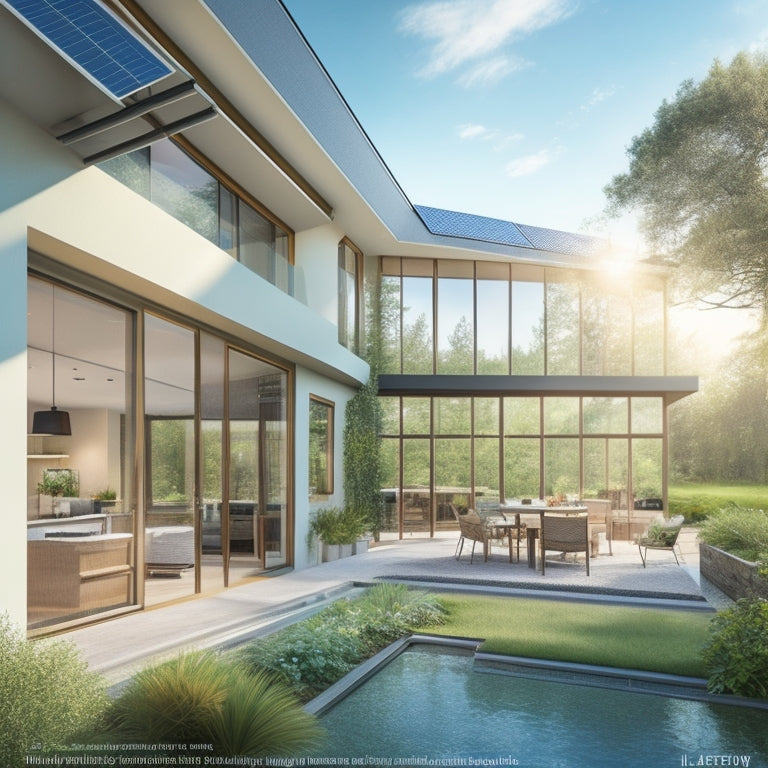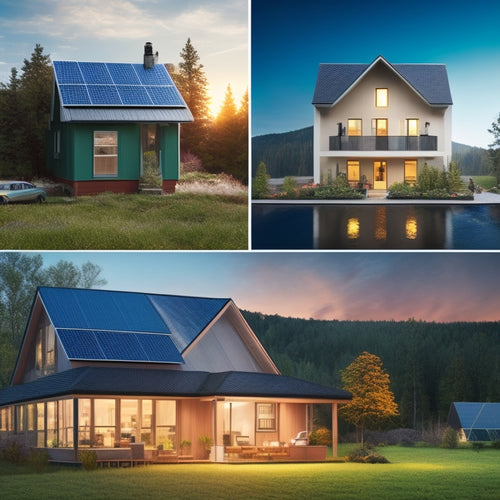
5 Efficient Air Circulation Methods for Green Homes
Share
You can utilize the power of natural ventilation techniques, whole house fans, and solar-powered ventilation systems to create a breezy, eco-friendly home. By incorporating these methods, you'll reduce your reliance on energy-intensive HVAC systems and promote a healthier indoor environment. For instance, cross ventilation and the stack effect can slash energy bills, while whole house fans can circulate air up to 40% more efficiently. Meanwhile, solar-powered ventilation systems and heat recovery methods can reclaim up to 90% of energy lost through ventilation, minimizing your carbon footprint. Explore deeper to find the perfect combination to unveil a more sustainable, comfortable living space.
Key Takeaways
- Cross ventilation and the stack effect reduce reliance on mechanical cooling and heating systems, promoting energy savings and a healthier indoor environment.
- Whole house fan installation creates a cooling breeze, reducing air conditioning needs and energy consumption when correctly sized and maintained.
- Solar powered ventilation systems utilize natural convection and passive cooling, decreasing fossil fuel reliance and carbon emissions.
- Heat recovery ventilation methods reclaim up to 90% of energy lost through ventilation, improving indoor air quality and minimizing heating and cooling needs.
- Optimized ceiling fan design and counterclockwise rotation in summer can make homes feel up to 4°F cooler, reducing reliance on energy-intensive HVAC systems.
Natural Ventilation Techniques
As you design your green home, incorporating natural ventilation techniques is an essential step in creating an efficient air circulation system. By utilizing the power of nature, you can reduce your reliance on mechanical cooling and heating systems, saving energy and promoting a healthier indoor environment.
Cross ventilation, which involves strategically placing windows and doors to allow cool air to enter and hot air to escape, is a simple yet effective technique. Additionally, incorporating eco-friendly charging infrastructure, such as renewable energy sources, can further reduce your carbon footprint.
The stack effect, where warm air rises and exits through upper vents, can also be utilized to create a continuous flow of fresh air. By incorporating these natural ventilation techniques, you can create a comfortable, eco-friendly living space that not only benefits the environment but also your own well-being.
Whole House Fan Installation
While natural ventilation techniques can greatly reduce your reliance on mechanical cooling systems, whole house fan installation can further optimize your green home's air circulation.
By installing a whole house fan, you can create a cooling breeze that circulates throughout your home, reducing the need for air conditioning. Additionally, incorporating solar-powered EV charging stations can attract eco-conscious consumers, increasing foot traffic and business opportunities renewable energy solutions.
Furthermore, regular maintenance of solar panels is essential for peak performance and energy efficiency.
Choose a fan that's correctly sized for your home to guarantee efficient airflow.
Install the fan in a central location, such as a hallway or living room, to maximize airflow.
Verify that your home is well-sealed to prevent heated air from escaping.
Operate strategically: run the fan during cooler hours, such as early morning or evening, to bring in fresh air and reduce heat gain.
Solar Powered Ventilation Systems
Utilizing the power of the sun, solar powered ventilation systems offer a sustainable solution to circulate air in your green home.
These systems utilize solar energy benefits to power fans and ventilators, reducing your reliance on fossil fuels and lowering your carbon footprint.
By leveraging natural convection and passive cooling, you can create a comfortable indoor climate without sacrificing your commitment to the environment.
With the integration of solar power integration in EV charging, you can further minimize your carbon emissions and enhance energy control.
Additionally, commercial solar panel installation can provide potential savings of up to 50% on energy bills.
By embracing solar power, you'll enjoy improved air quality, reduced energy bills, and a healthier living space.
Plus, these systems are quiet, low-maintenance, and can be easily integrated into your existing HVAC setup.
Heat Recovery Ventilation Methods
Energy Recovery: Heat recovery ventilation methods can recover up to 90% of the energy that would otherwise be lost through ventilation.
By leveraging renewable energy solutions, such as solar power, households can further reduce their carbon footprint and energy bills zero-emission guarantee.
-
Energy Recovery: Heat recovery ventilation methods can recover up to 90% of the energy that would otherwise be lost through ventilation.
-
Improved Indoor Air Quality: By constantly circulating and filtering the air, you can remove pollutants and allergens, creating a healthier living space.
-
Reduced Carbon Footprint: By minimizing the need for heating and cooling, you can markedly reduce your carbon footprint.
In fact, solar power offers a clean energy source, considerably reducing greenhouse gas emissions.
- Increased Comfort: Heat recovery ventilation methods provide a consistent, comfortable temperature, eliminating drafts and hot spots.
Ceiling Fan Air Circulation Boost
As you strive to create a green home, incorporating a ceiling fan air circulation enhancement can be a simple yet effective way to improve air circulation and reduce your reliance on energy-intensive HVAC systems.
By optimizing fan blade design, you can increase airflow direction, creating a cooling effect without consuming excessive energy. A well-designed ceiling fan can circulate air up to 40% more efficiently than traditional fans.
Additionally, running your ceiling fan in a counterclockwise direction during summer months can make your home feel up to 4°F cooler, allowing you to raise your thermostat and save energy.
Moreover, integrating energy-efficient solutions, such as high-efficiency solar panels, can lead to significant carbon reduction and lower operating costs.
Frequently Asked Questions
Can Air Circulation Systems Be Integrated With Existing HVAC Systems?
You'll be surprised to know that 30% of energy consumption is wasted on inefficient HVAC systems. Yes, you can integrate air circulation systems with your existing HVAC, optimizing airflow and leveraging ductless solutions for a more efficient, eco-friendly home.
Are Energy-Efficient Air Circulation Methods Cost-Effective in the Long Run?
You'll find that energy-efficient air circulation methods pay off in the long run, yielding significant energy savings and long-term benefits that'll give you financial freedom, reducing your carbon footprint and aligning with your values of living sustainably.
Do Air Circulation Systems Require Regular Maintenance and Cleaning?
You'll find that regular filter replacement and cleaning are essential to maintaining system efficiency, ensuring your air circulation system runs smoothly and effectively, and you'll reap the benefits of improved indoor air quality and reduced energy bills.
Can Air Circulation Systems Be Installed in Existing Homes or Only New Builds?
You can breathe easy, knowing air circulation systems aren't limited to new builds; retrofit options abound, allowing you to upgrade your existing home, but be prepared to tackle installation challenges that may arise during the process.
Are Air Circulation Systems Suitable for Homes in Extreme Climate Zones?
You're wondering if air circulation systems can handle extreme climate zones. The answer is yes, as long as you consider climate-specific design adaptations, ensuring the system's flexibility to adjust to varying temperatures and humidity levels, ultimately providing a comfortable, sustainable living space.
Related Posts
-

What Does Your Home Energy Audit Report Reveal?
Your home energy audit report reveals a detailed analysis of your energy consumption patterns, highlighting areas of ...
-

How to Upgrade Your Home With Geothermal Innovations
You're now on the cusp of utilizing the Earth's natural thermal energy to revolutionize your home's heating and cooli...
-

Why Biodegradable Dish Soap Matters for Earth-Conscious Homes
You likely don't realize that the dish soap you're using today will still be harming the environment long after you'v...


